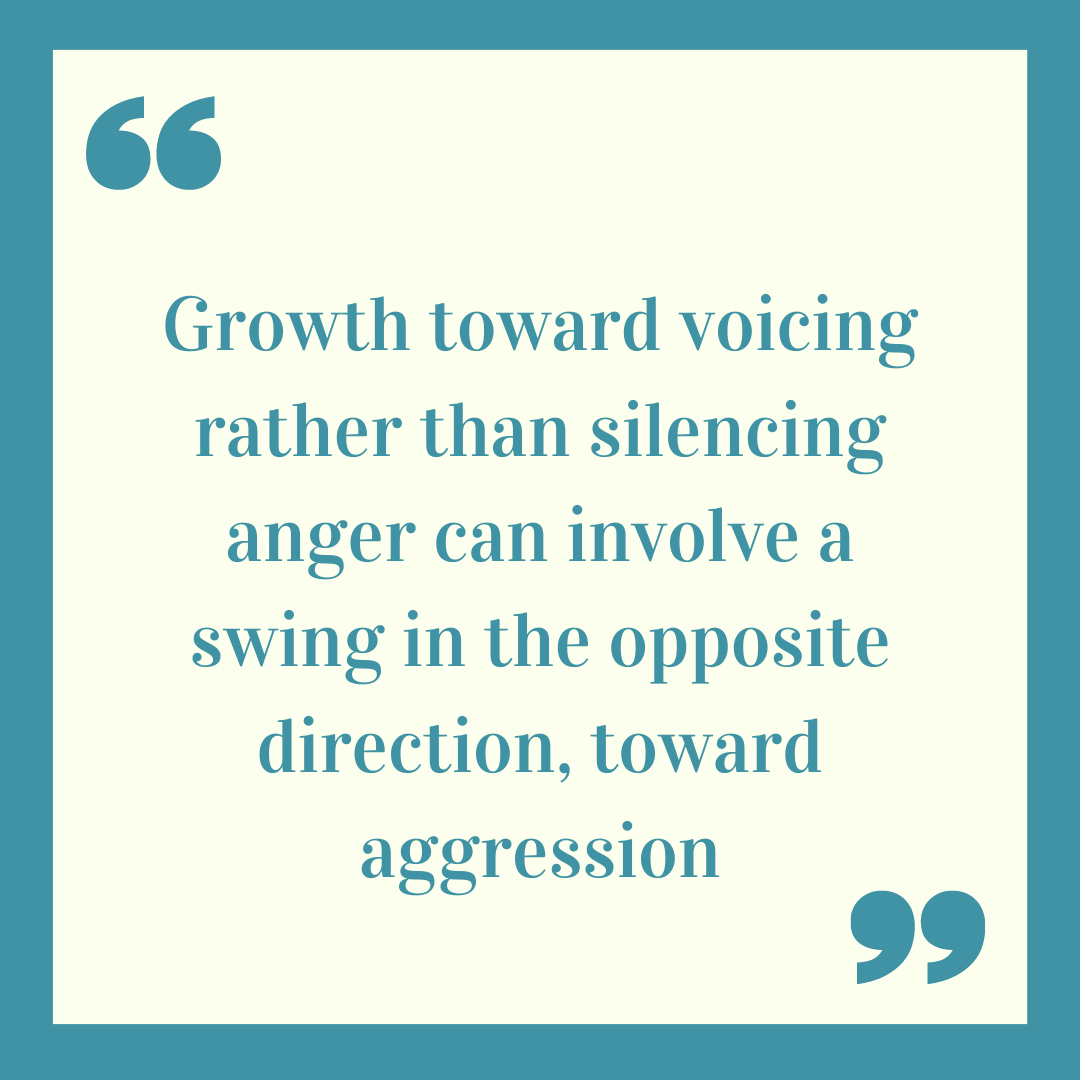|
Self-advocacy in relationships is hard for people pleasers. This is true even when we find ourselves in relationships with generally supportive partners. It can be challenging, even scary, to stand up for ourselves, be vulnerable, and clearly (and kindly!) communicate how we feel and what we need. Expressing our needs and feelings in relationships often involves being vulnerable and assertive at the same time: sharing what is hard for us, feeling entitled to receiving support, and asking for it. Self-advocacy also involves letting go of harsh self-criticism. It can be easy for people pleasers to blame ourselves - and get so bogged down in "shame spirals" - that we can't see others' contributions to our struggles, and conversely, ways that they can help. People pleasers also get caught in self-silencing: a blocking of one's expressions, one's voice. Self-silencing is typically motivated by fear. If I express displeasure with something my partner did - Will I be invalidated? Will I upset them? Will they get upset with me? It can feel safer, more comfortable, to just keep quiet. ****************************************************************** An alarm clock blares in Toronto, shortly after the Spring Forward time change. It rings, and rings, and rings. Her nervous system irritated, Shira presses snooze on her partner's alarm. Jonathan, a recovering people pleaser, depends entirely on his alarm to wake up. When his alarm rings again, he leaps out of bed, groggy and miserable. He is going to be late for work. His tired brain begins to be hard on him, criticizing him for being late, despite his years of work cultivating self-compassion. He begins to "shame spiral." Jonathan soon realizes, however, that his darling partner has messed with his system for waking up. "This isn't entirely my fault!" he exclaims to himself. Though this helps, it doesn't eliminate his shame. Recognizing what had happened, his anger spikes; however, this anger is mixed with lingering shame. He angrily demands that his partner not interfere with his alarm clock: "Don't touch my phone!" he growls. Jonathan has found his voice - which is a great achievement for a recovering people pleaser - but it's aggressive! In his mixed state of anger and shame, Jonathan demands, rather than ask assertively. We demand when we feel angry, and that anger is mixed with other emotions that inhibit it: fear - that I won't get what I need, or shame - that I don't entirely deserve it. This inhibiting fear or shame can result in an explosive, attacking anger that covers the healthy assertive anger underneath. Healthy assertive anger comes from a deep, centred, core place. We typically feel a sense of calm and strength when we are expressing it. It is about owning and feeling entitled to what we know we deserve. It is about holding others accountable for boundary violations, big and small. For Jonathan, it might have sounded like a clear, calm, assertive expression like, "Honey, you shut my alarm. I depend on it to wake up. I need you to leave it be." But Jonathan is not yet there at this early morning moment. His anxious rushing, his shame, his grogginess, contribute to his expressing his anger in an explosive and demanding way. Importantly, demanding, despite its obvious pitfalls, represents growth for a recovering people pleaser. Growth toward voicing rather than silencing anger can involve a swing in the opposite direction, toward aggression. Jonathan is not silencing his needs - which is great! - but he is also not bravely and kindly asking for them to be met. Unsurprisingly, Jonathan's demands are ineffective. "No!" Shira retorts. "You can't just let your alarm blare. It's too irritating for me!" Upon hearing Shira's "No", Jonathan's anger heightens, to the point that it is stronger than his shame. He is more fully aware of the fact that Shira has violated his boundaries, and denied him what he needs. He comes to a place where he feels entitled to his anger. Perhaps paradoxically, this helps him feel calmer, more in control. Feeling his anger more fully, he then becomes more in touch with his hurt at not getting the support he has come to expect from his partner. He also notes feeling a bit guilty, which helps him more fully recognize that he has been demanding, not assertive. Jonathan tries again, using his feelings of anger, hurt, and healthy guilt as guides. "I'm really struggling with morning wakeups right now, and you've messed with my system. I've turned to you, not in the best way, but hoping to problem solve, and all I've received from you is a loud NO! That hurts, and I don't deserve that." The pair then proceed to problem solve, and find a compromised solution that ensures a timely wake up for Jonathan without irritating Shira. Expressing our feelings disarms. Sharing pain with caring, responsive people elicits empathy, and anger elicits respect. In difficult relational moments, try answering the following questions: What hurts? What do I need here? What do I deserve? It can be very hard to trust our loved ones with our vulnerability, and our assertive anger. People pleasers often have histories of relationships with people who were not responsive to their feelings and needs. They may wonder: If I express my vulnerability, and ask assertively and kindly for my needs to be met - will my partner or close friend really respond? Will they really be there for me? Even worse, will they get mad at me?! Learning to assert in this way often requires a processing of past relational wounds. A working through of old fear and shame so that it no longer silences us, or on the other hand, makes us aggressive when we wish to be assertive. A recognition that this person standing in front of me is not the same person that could not hear or see me in the past. I am not the same person; I have grown. Whew! It's hard work, experiencing and expressing complex feelings, being a human in connection. Takeaways: When you find yourself having a strong reaction in an interaction with your partner or close friend: Take a pause! Focus inside, with some curiosity. Discover what you are feeling! Or do this after the fact, if doing it in the moment feels inaccessible. Ask yourself: What hurts right now? And what am I not getting that I need, that I deserve? Try to communicate your pain in a vulnerable way, and try to express your anger in a calm and grounded way. Recognize and allow your fear and shame, but see if you can prevent it from silencing you, or conversely, causing you to explode. And, if you do self-silence or explode - see if you can offer yourself some compassion. Of course you self-silence - you are scared! Your growing edge is to find your voice. Of course you explode! Your anger is mixed with shame and/or fear! You don't entirely feel entitled to what you are demanding! Your growing edge is to cultivate a sense of healthy entitlement. Cultivate trust in the people who have proven themselves trustworthy. Trust your feelings to do their job - of eliciting the responsiveness that you need. Expressing sadness and vulnerability evokes care; expressing assertive anger reinforces boundaries and elicits respect. What has helped you to be more assertive in close relationships? How have you moved from self-silencing to finding your voice? How have you shifted from demanding to asking?
1 Comment
|
Proudly powered by Weebly



 RSS Feed
RSS Feed